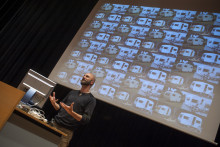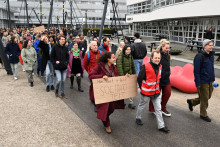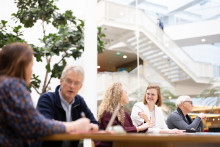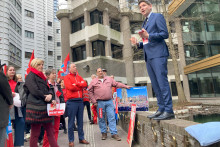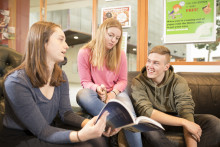Angelo Vermeulen has worked on many art projects that combined technology and biology. One of them is Biomodd project that reuses old computer components to create functioning networks. Within this project, Vermeulen co-creates a system in which living plants are built into a computer, which use the waste heat of the electronics to grow. Vermeulen was also approached by the European Space Agency to cooperate on a project developing an artificial ecosystem that will be used for the future settlement in space. This ecosystem uses all human waste and turns it into nutrients for plants that the astronauts can eat.
Mars simulation mission
Vermeulen was the crew commander of a Mars simulation mission, funded by NASA. During this mission, the team lived in a Mars base built on a volcano Hawaii and their main goal was to develop a food system for future settlement on Mars. Vermeulen explains: “Astronauts must eat the same food over and over again, which results in so called menu fatigue. To assure astronauts don´t refrain from food, we suggested that the astronauts should cook their own meals. During the mission, we recorded and evaluated every meal we ate and it became quite obvious that we preferred the meals we cooked ourselves.”
Starships
Nowadays Vermeulen focuses on design of starships intended for deep space expeditions. “Existing ideas about space travel only pay limited attention to ecosystems and they use a military command structure,” says Vermeulen. “I would like to introduce three main principles into the space travel and the future of human habitation and survival. These principles are: integration, evolution and co-creation.” All these principles are also key elements of the project Seeker.
Seeker project
As a part of Seeker project, Vermeulen and a team, consisting of people from the local community, build a prototype starship. “Seeker is an invitation for communities to build a starship and to see how people, technology and biology can work together. During this project, we co-create an artwork that evolves over time. I believe that a technology that behaves more like biology, can adapt easier to its changing conditions and has a better chance to survive long voyages,” says Vermeulen.
The Seeker projects have been previously realized in Deventer, Hasselt, Ljubljana and during the Dutch Design Week. The resulting starship is always different from the previous one, as the design changes based on the community creating it. The Twente edition of Seeker runs from May 27 until mid September 2014 and Vermeulen´s plan is to build a starship using several caravans stacked on top of each other. He also plans on running an isolation experiment, as he has done several times before. During this experiment, a small group of people lives in the starship prototype for several days.
The results of this innovative project will be presented at the GOGBOT festival, taking place in September in Enschede. If you would like to help creating Seeker project for GOGBOT, please send an email to [email protected].



